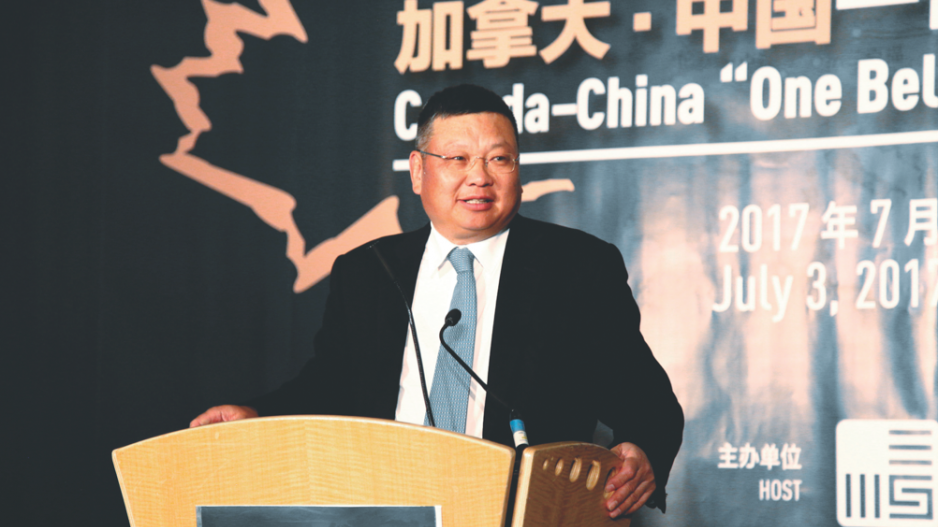The acronym OBOR, which stands for One Belt, One Road, China’s primary foreign policy initiative that aims to recreate the Silk Road linking Asia and Europe, has been popping up with curious frequency in Vancouver this year.
The latest such occurrence was on July 3, when alumni from China’s prestigious Cheung Kong Graduate School of Business (CKGSB) gathered in the city to hold their own OBOR economic forum, inviting the school’s founding dean to B.C. to give the keynote speech while attracting a number of B.C. academic and political officials.
At least one other large conference centred around OBOR – this one organized by the Grizzly Bear Institute – brought together Chinese-Canadian scholars at the University of British Columbia (UBC) and Simon Fraser University this year.
Meanwhile, meetings of local business associations within the Chinese community have also often broached the topic of OBOR, urging B.C. businesses to get on board with what Beijing calls “Globalization 3.0,” after the British model in the 1800s and United States-led efforts after 1945.
Yves Tiberghien, director of the Institute of Asian Research at UBC, spoke at both Vancouver conferences and noted this spike in visibility for the Chinese initiative locally as a confluence of several factors, including the timing of a number of events in Beijing and its recent focus on Canada as a partner in the West.
“It’s the priority [for Beijing],” Tiberghien said of both OBOR and China’s relationship with Canada, widely seen as improving after the election of Justin Trudeau as prime minister in 2015. “If you show up in Ottawa and say, ‘I want to promote women entrepreneurship and leadership in business,’ federal officials would love you, because that’s a priority. Well, OBOR is the priority for China. So even within China, if you show up to talk with government officials and say, ‘I’m doing something with OBOR,’ you are more likely to get the support you are seeking because there’s a preference for OBOR right now.
“Many private actors in China know that [it] is good for business and their connections to do stuff on OBOR. Even though they are free to do [as they choose], they do it because they know it will be beneficial.”
The period between May and this fall may see an especially high concentration of events, Tiberghien added, since those are the dates of two key events – the first Beijing OBOR global conference in May and the 19th National Congress of the ruling Communist Party of China in the fall. As OBOR is one of the most high-profile initiatives directly linked to the administration of Chinese President Xi Jinping, it is likely Vancouver, as well as other western cities, will see more of a push from Chinese officials to promote the initiative during this time period.
“It is probably true that, within the Chinese diplomatic corps around the globe, there’s more of an emphasis right now on OBOR,” Tiberghien said. “It’s flexible, and they would love to have Canada take part – just like [a free trade agreement], which would be China’s first with a G8 country. It’s a priority for China right now, which would explain the focus in places like Vancouver.
For CKGSB founding dean Xiang Bing, who has his own personal links to Canada, having received his PhD from the University of Alberta, the July 3 event, sponsored by Chinese financial journal Caifu, was primarily a way to connect CKGSB’s alumni group in Canada with decision-makers such as Minister of National Defence Harjit Sajjan, who attended the meeting.
“CKGSB has more than 10,000 alumni worldwide, and we have alumni associations across the world, with the alumni association of Canada based in Vancouver,” Xiang said. “However, [OBOR] is not simply limited to the countries dotted along a map of Central Asia – it really is open to all. Canada as a whole, and in particular the Chinese-Canadian business community, can help explore and promote opportunities under the belt and road initiative.”
Previous meetings have identified Canada’s potential role as a provider of financial investment or expertise in fields such as communications technology and transportation infrastructure, but some observers have noted that precisely defining what constitutes an OBOR project can be difficult.
But Xiang stressed that in a world in which western democracies seem to be shifting away from globalization, Canadian small and medium-sized enterprises should link up with projects under the OBOR umbrella, wherever they are found.
“We are in an era of change, which includes disruptive technology and the reconfiguration of the world’s trade and investment system, as well as the movement towards deglobalization,” he said. “However, with the re-emergence of China’s economy, Chinese companies are expected to have global vision and to leverage resources globally.… Forums such as these help to foster global co-operation, and both China and Canada can help take a lead role going forward.”
Tiberghien, who is compiling a list of projects linked to OBOR, said there may be as many as 2,000 on the final tally. He warned that while the scope of OBOR fascinates him as a researcher, businesses would have to weed out the non-viable projects on the list to find the real opportunities.•




